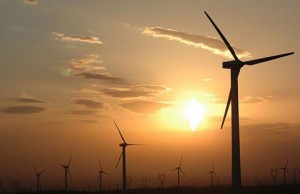In Depth: Wind industry is caught in a Brazilian steel-price trap
High domestic steel prices are one of the main barriers to making future wind projects profitable in Brazil.
Developers are facing razor-thin margins after the two power tenders in August saw some projects awarded power-purchase contracts at less than R$100 ($58.30) per MWh.

High domestic steel prices are one of the main barriers to making future wind projects profitable in Brazil.
The price of steel is 50-70% higher in Brazil than on the international market. Belo Horizonte-based Usiminas — a former state-owned company privatised in the 1990s — enjoys a near monopoly on domestic steel plate supply, and the government allows it to set different prices for domestic sales and exports. At the same time, Brazil’s national development bank, BNDES, will not give developers full access to its funding unless at least 60% of a project’s equipment is produced in Brazil. That percentage is determined by weight, and towers can constitute 80% of a wind farm’s mass. Nearly all Brazilian developers depend on the bank’s cheap financing to make their projects viable, and BNDES does not consider foreign steel rolled in Brazil as local content, meaning that companies are generally unable to import from abroad.
Last year, BNDES was considering an exception to its rules for imported steel, but the proposal was shelved in August. Brazil’s steel industry is facing strong competition from imports, putting pressure on margins, so producers fiercely oppose any relaxation of local-content rules. “Clearly, if you want to play in Brazil, you have to get access to BNDES financing, and that exposes you to these steel prices,” says Brian Gaylord, an analyst with MAKE Consulting in Chicago, who specialises in the Brazilian market.
He says the high cost of steel plate makes towers disproportionately expensive in Brazil. Gaylord says some companies experimented with importing Asian steel for about a third of their requirements, but the strategy needs high volumes to create any real price advantage.
Wind turbine manufacturers, developers and industry representatives are highly critical of government policy, and are increasingly looking to concrete towers as an alternative.
“Obviously they [Brazil] want to build a steel industry and they are doing it by artificially raising prices,” Steve Sawyer, secretary-general of the Global Wind Energy Council, tells Recharge. “It’s good for the steel industry, but bad for everyone else.”
“It’s the prerogative of a sovereign state,” says Alstom’s vice-president for wind, Alfonso Faubel. “Steel is used in development, so if you want development to take place you are always going to have certain conditions of local content.”
But Edgard Corrochano, Mercosur director at Gamesa, which was one of the most aggressive bidders in the recent tenders, says he hopes the situation will change, with Usiminas becoming more competitive. “Either [Usiminas] gets with the programme and they have international prices in Brazil, or we are going to see a tendency to go to concrete towers. And as soon as that happens, it’ll be very difficult for it to come back to steel.”
Other manufacturers point out that steel towers, as well as being expensive, are difficult and costly to transport.
Suzlon Brazil chief executive Arthur Lavieri says: “Almost everybody is talking about concrete, and it’s not only because steel prices in Brazil are completely insane, but also because bringing steel tubes of 100-120 metres 3,000km from the biggest factories is simply not possible.”
However, concrete towers need to be made on site, which can be expensive.
“To take advantage of price advantages you need a big project size,” says Gaylord.
Leading local turbine manufacturer Wobben Windpower is experimenting with using mobile concrete plants to build the towers, while Vestas sales director Marcelo Hutschinski says his company can offer concrete towers for wind farms larger than 100MW.
Officials at some turbine manufacturers admit there are drawbacks to concrete, and say they have few alternatives to buying expensive steel.
Source: RECHARGE; Ben Backwell, Rio de Janeiro; Published: Thursday, September 15 2011

